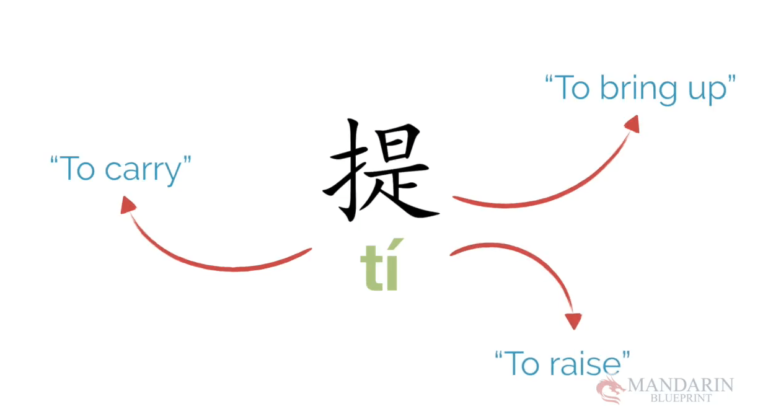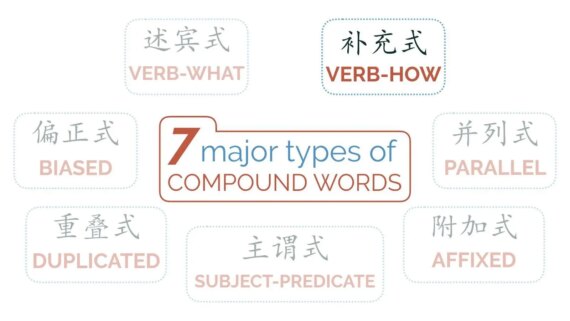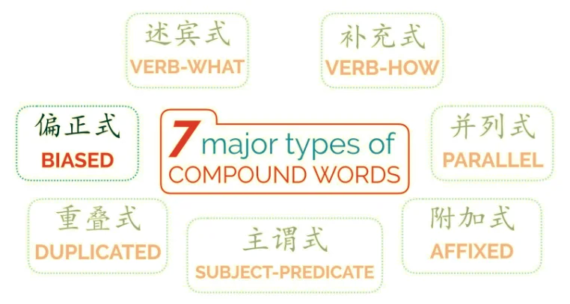Mention in Chinese – Chinese Character 提 tí

提- tí (Mention in Chinese)
The definitions of 提 (mention in Chinese) have a great mix of two types of the verb, one concrete and taking place in reality, another abstract and yet somehow in the same vein as the more concrete version. You can use 提 (mention in Chinese) alone to mean that you lift something up with your arm and then have it hang down to your side as you often would with a shopping bag or a briefcase.
This is also why the left-side component of the character is 扌, which is representative of a “hand”. The second meaning is “to raise or to bring up” a question or a problem. That, of course, is not a concrete thing that you are “raising”, but somehow it just doesn’t sound correct to say “put down a question”. The direction is upward, because we bring it to a higher level of our attention, break it down, and then answer it.
But how might it be used in a few words? First, let’s look at four words that have a compound word structure we call “Verb-What” (述宾式 shùbīn shì). This structure indicates that the first of the two characters is a verb and the second character is what is receiving the action of the verb. 提 provides a great opportunity to consider this structure:
提议 (yì)
So 提议 literally means “to bring up suggestion”, and so if you imagine a room full of people at a board meeting, if someone wants to make a proposal, they likely will raise their hand before delivering their suggestion. Verb: mention (提 in Chinese). What is being brought up? A suggestion (议).
提问 (wèn)
Considering that 问 means “to ask” or “a question”, so the meaning of 提问 should be obvious when we consider the “Verb-What” structure. The verb is “to bring up”. What is being brought up? A question (abbreviated from 问题 wèntí). So whenever you want to pose a question, you can say 提问.
提神 (shén)
Oh, the morning coffee, how lovely it can be! Why is that though? Well, its because it “lifts” (提) our “spirit“ (神). Anything you do that brings you our of a tired or depressive funk is helping you 提神. Verb: to lift or raise (提). What is being lifted or raised? Your spirit (神).
提名 (míng)
Suppose you are holding class president elections back in middle school. Your friend is quite popular and you think she has a pretty good shot at winning, so you can “mention” 提 (mention in Chinese) her “name” (名) to nominate her. Pretty neat huh? Verb: to bring up or lift (提). What is bring brought up or lifted? A name (名).
A couple of cool words arise when analyzing 提 and combining it in two different ways with the character 前 qián (“before” or “in front”). Looking at the two words on paper, the only difference is the order, but the meaning actually differs quite significantly, let’s have a look:
提 前 (qián)
提前 indicates that you are going to “bring something up”-“beforehand”. For example, if you going to your friend’s house but you haven’t set a specific time, they might say “OK, when you are about to arrive tell me beforehand”. This word could also be used when an event or an appointment has been moved to an earlier time.
前提 (qián)
前提 is a much different concept, meaning premise or prerequisite. It’s another type of compound word we call “biased” or 偏正式 piānzhèng shì, where 提 is adjusted by the first character 前, which is the more important of the two. When is it mentioned 提? Before! (前), which is cool way of conceptualizing the premise of your argument.
The final two words we’ll look at are the “Verb-How” construction (补充式 bǔchōng shì). This construction is similar to the above mentioned “Verb-What” structure, but unsurprisingly the difference lies in the second character. While the second character in the Verb-what structure describes what is receiving the action of the verb, the second character in the Verb-how structure describes the result of the verb. Let’s look at the following two examples to make this more clear:
提高 (gāo)
提高 indicates that something has been “mentioned” (提), and the result is that is now “higher” (高) than before, which is another way of conceptualizing “to improve”. Verb: to lift or to raise. What is the result of the verb? It is now higher (高)
提 醒 (xǐng)
This was is pretty cool when you consider that 醒 means “awake” or “sober”. So how is“awake” or “sober” the result of you “bringing something up” (提)? Well, that’s actually the function of reminding someone of something. Make sure they stay “awake and aware” of the upcoming commitment. Verb: to bring up (提). What is the result of the verb? Being awake and aware (醒).
Hopefully taking a closer look at 提 will 提高 your ability to notice individual characters in Chinese and keep giving you small 提醒s that learning word-by-word is far inferior to learning character-by-character.
Curious to learn more? Read our blog posts about Chinese characters and the stroke order rules!








